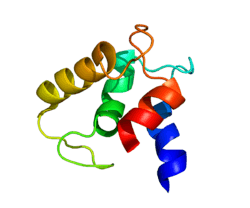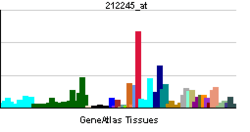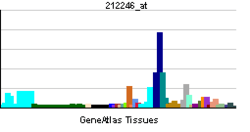MCFD2
| View/Edit Human | View/Edit Mouse |
Multiple coagulation factor deficiency protein 2 is a protein that in humans is encoded by the MCFD2 gene.[3][4][5] Mutations in MCFD2 cause the combined deficiency of factor V and factor VIII (F5F8D), a recessive bleeding disorder. MCFD2 and ERGIC-53 (or LMAN1) form a protein complex and serve as a cargo receptor to transport FV and FVIII from the ER to the Golgi body. Mutations in LMAN1 gene (encoding ERGIC-53 or LMAN1) also cause F5F8D.
References
- ↑ "Human PubMed Reference:".
- ↑ "Mouse PubMed Reference:".
- ↑ Zhang B, Cunningham MA, Nichols WC, Bernat JA, Seligsohn U, Pipe SW, McVey JH, Schulte-Overberg U, de Bosch NB, Ruiz-Saez A, White GC, Tuddenham EG, Kaufman RJ, Ginsburg D (May 2003). "Bleeding due to disruption of a cargo-specific ER-to-Golgi transport complex". Nat Genet. 34 (2): 220–5. doi:10.1038/ng1153. PMID 12717434.
- ↑ Deka N, Wong E, Matera AG, Kraft R, Leinwand LA, Schmid CW (Mar 1989). "Repetitive nucleotide sequence insertions into a novel calmodulin-related gene and its processed pseudogene". Gene. 71 (1): 123–34. doi:10.1016/0378-1119(88)90084-4. PMID 2463956.
- ↑ "Entrez Gene: MCFD2 multiple coagulation factor deficiency 2".
Further reading
- Nyfeler B, Zhang B, Ginsburg D, et al. (2007). "Cargo selectivity of the ERGIC-53/MCFD2 transport receptor complex.". Traffic. 7 (11): 1473–81. doi:10.1111/j.1600-0854.2006.00483.x. PMID 17010120.
- Mohanty D, Ghosh K, Shetty S, et al. (2005). "Mutations in the MCFD2 gene and a novel mutation in the LMAN1 gene in Indian families with combined deficiency of factor V and VIII.". Am. J. Hematol. 79 (4): 262–6. doi:10.1002/ajh.20397. PMID 16044454.
- Zhang B, Kaufman RJ, Ginsburg D (2005). "LMAN1 and MCFD2 form a cargo receptor complex and interact with coagulation factor VIII in the early secretory pathway.". J. Biol. Chem. 280 (27): 25881–6. doi:10.1074/jbc.M502160200. PMID 15886209.
- Hillier LW, Graves TA, Fulton RS, et al. (2005). "Generation and annotation of the DNA sequences of human chromosomes 2 and 4.". Nature. 434 (7034): 724–31. doi:10.1038/nature03466. PMID 15815621.
- Gerhard DS, Wagner L, Feingold EA, et al. (2004). "The status, quality, and expansion of the NIH full-length cDNA project: the Mammalian Gene Collection (MGC).". Genome Res. 14 (10B): 2121–7. doi:10.1101/gr.2596504. PMC 528928
 . PMID 15489334.
. PMID 15489334. - Spatuzza C, Renna M, Faraonio R, et al. (2004). "Heat shock induces preferential translation of ERGIC-53 and affects its recycling pathway.". J. Biol. Chem. 279 (41): 42535–44. doi:10.1074/jbc.M401860200. PMID 15292203.
- Ota T, Suzuki Y, Nishikawa T, et al. (2004). "Complete sequencing and characterization of 21,243 full-length human cDNAs.". Nat. Genet. 36 (1): 40–5. doi:10.1038/ng1285. PMID 14702039.
- Toda H, Tsuji M, Nakano I, et al. (2003). "Stem cell-derived neural stem/progenitor cell supporting factor is an autocrine/paracrine survival factor for adult neural stem/progenitor cells.". J. Biol. Chem. 278 (37): 35491–500. doi:10.1074/jbc.M305342200. PMID 12832409.
- Strausberg RL, Feingold EA, Grouse LH, et al. (2003). "Generation and initial analysis of more than 15,000 full-length human and mouse cDNA sequences.". Proc. Natl. Acad. Sci. U.S.A. 99 (26): 16899–903. doi:10.1073/pnas.242603899. PMC 139241
 . PMID 12477932.
. PMID 12477932. - Nichols WC, Terry VH, Wheatley MA, et al. (1999). "ERGIC-53 gene structure and mutation analysis in 19 combined factors V and VIII deficiency families.". Blood. 93 (7): 2261–6. PMID 10090935.
- Neerman-Arbez M, Johnson KM, Morris MA, et al. (1999). "Molecular analysis of the ERGIC-53 gene in 35 families with combined factor V-factor VIII deficiency.". Blood. 93 (7): 2253–60. PMID 10090934.
This article is issued from Wikipedia - version of the 6/2/2016. The text is available under the Creative Commons Attribution/Share Alike but additional terms may apply for the media files.


